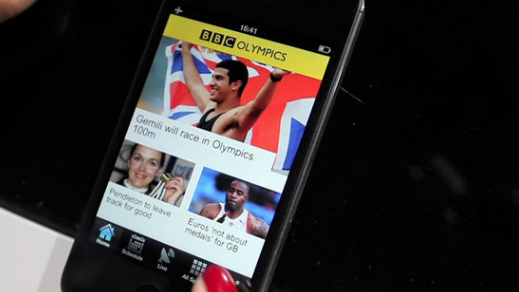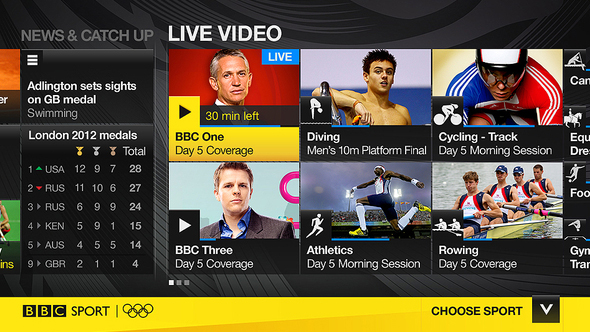How Adobe is powering the BBC's Olympics coverage
Project Primetime enables tens of streams with minimal delay

Adobe has revealed its Primetime tech is providing the legwork behind the BBC's massive Olympics streaming effort for both live and on-demand streams.
The Beeb previously announced it would provide 24 extra channels that will be available on Sky and Virgin Media, but Adobe is providing the ability to make these available via streams whether on PC, Mac, smart TV or a mobile device. Its tech is also enabling will also be thousands of hours of on-demand highlights and catch-up TV via BBC iPlayer.
The Primetime system is a single platform that uses Adobe Media Server to push content out to devices of any type, whether it's a laptop, an iOS browser or iPlayer on a connected TV. Although elements of Primetime have been available before, this is the first time Adobe has brought them all together to deliver such a major event.
However you want it
We spoke to Steve Allison, a senior manager for Adobe's Media and Advertising Solutions division, about the partnership. "Primetime is a way of delivering high volume and high quality video content out to any kind of device at the other end. This Olympics is going to change the way people change people consume sport content in particular. What the BBC is doing is showing every single event from start to finish, to catch up to rewind. You can go online and see it in action which is really rather cool."
"The system is also going to enable us to create the highlights as video on demand files very quickly. So the BBC is taking in the camera feeds from the IOC, running it through our technology and puboxshing it out over their Intelligent Video Player."
"You can jump between different events and live streams, but also be able to time jump – if your event has already started you can rewind to the start. So very much going away from the traditional approach where the editor decided what you watch, it's moving towards a self-directed, non-linear approach."

Allison was also happy to talk about ad-funded content – Primetime presents commercials and programming in a single stream rather than having separate streams coming in and out – but says the BBC has a unique challenge in terms of devices.
Get daily insight, inspiration and deals in your inbox
Sign up for breaking news, reviews, opinion, top tech deals, and more.
"The challenge the BBC has is that anybody who pays the license fee should be able to watch [the content]. And there's a great variety of devices out there, phones tablets and internet-enabled televisions. We've enabled a number of integrations through the BBC's systems into the iPlayer coverage but also we're leveraging the great capabilities [of] live feeds and to be able to convert for iOS devices, which is obviously the only one without Flash on. We can reach all those different devices [with] Primetime."
Dealing with different bitrates
We also asked Allison to explain a little about the huge number of streams that have to be prepared because of different bitrates and devices. "There are 24 live channels they're pushing out, there's also [those for] iPlayer. Each of which has multiple bitrates so you can do adaptive streaming so you can move between high and low quality depending on what your network is doing. So in some cases there are up to seven different bitrates. That's a tremendous amount of content being pushed out of the BBC system."
Primetime works differently from the BBC's usual iPlayer provision, says Allison. "iPlayer is a true stream which has low latency but obviously the more users you have the more you need to push out that signal. HTTP then becomes very exciting because you don't need that one to one connection and you can service a lot more people because it's just HTTP traffic and it can be cached.
"That's essentially what the Adobe Media Server does. It converts the 24 streams into different bitrates and pushes them out. The normal problem with HTTP is latency, you don't want people to wait, it's coming up to a goal and something starts buffering. A lot of thought went into how we can make the user experience as smooth as possible.
"[Users] don't want to think about or care about the technology behind the scenes – the user experience should be pretty cool wherever you are. All things being equal, 15 seconds should be the maximum latency that you can expect."
"One of the great things is that people can rewind and rewatch, so there's going to be as many people going back and watching content. Latency is obviously important and we work to reduce it, but it won't interfere [with people's experience]."
Taking the strain
But what of the strain on network infrastructure? "We gave serious consideration to whether we'd bring the UK internet to its knees with this level of output. We expect a massive amount of mobile consumption of this stuff. People are going to be checking up on their phones and maybe when they're watching TV they'll also have their tablet with them.
"The idea of HTTP is to be able do all that caching so that we've got a very resilient, network-aware architecture in there so we can deliver that highest quality as far as possible. And if you can't get the highest quality there should still be a [stream] that you can receive. So obviously the BBC handles their relationship with the ISPs, everyone is geared up to expect a lot of traffic and we've made provision so we can get as much [content] out there."
Adobe previously announced it has also worked with US Olympics broadcast partner NBC on two free Adobe AIR-powered apps for the US; NBC Olympics Live Extra and NBC Olympics. Both are available for iOS and Android and promise more than 3,500 hours of Olympic streamed content.
Primetime is currently on a limited trial with selected partners, but Adobe hopes that full rollout will happen during the second half of 2012.
Dan (Twitter, Google+) is TechRadar's Former Deputy Editor and is now in charge at our sister site T3.com. Covering all things computing, internet and mobile he's a seasoned regular at major tech shows such as CES, IFA and Mobile World Congress. Dan has also been a tech expert for many outlets including BBC Radio 4, 5Live and the World Service, The Sun and ITV News.